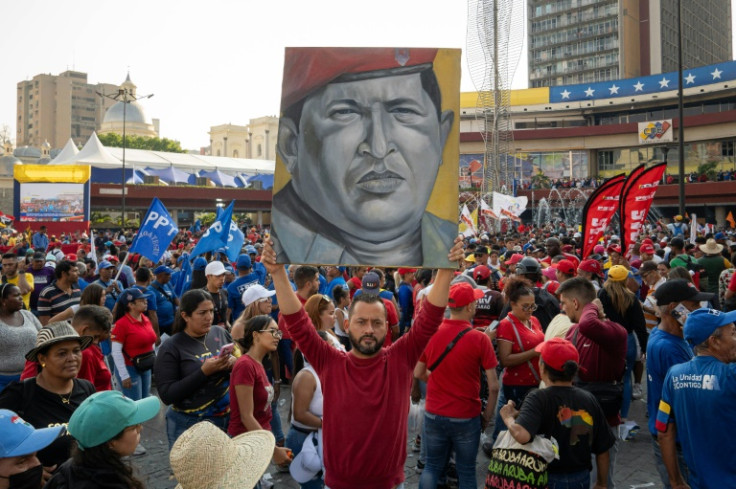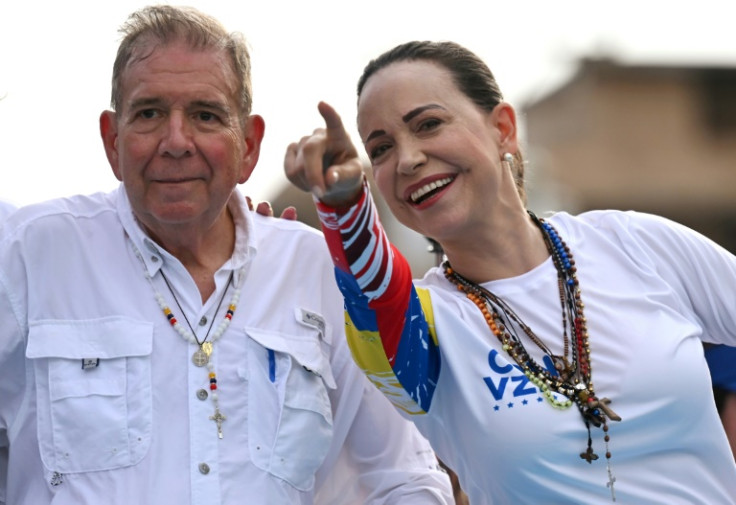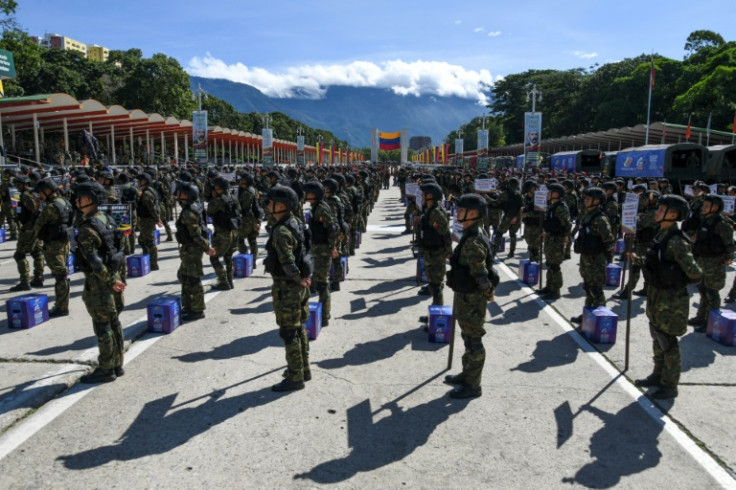Fraught Election Campaign Closes In Venezuela

A fraught election campaign closed Thursday in Venezuela, mired in uncertainty after President Nicolas Maduro warned of a "bloodbath" if he loses -- which polls suggest is likely.
Thousands attended final rallies in the capital Caracas, about a kilometer (0.6 miles) apart, for Maduro and his opposition rival, Edmundo Gonzalez Urrutia.
The incumbent, seeking a third six-year term, trails far behind Gonzalez Urrutia in stated voter intent, but observers doubt he is ready to give up power.
In a video on Thursday, Maduro reiterated to the nation that only he could "guarantee peace and stability," while Gonzalez Urrutia urged Venezuelans to not let "the message of hate... intimidate you."
At the Maduro rally, where party lackeys handed out T-shirts to pumping music and beating drums, voters hailed their "gallo pinto" candidate -- a fighting cock emblem he has adopted as a symbol of strength, as they chanted: "Vamos Nico!" (Let's go Nico.)
At the gathering for Gonzalez Urrutia, supporters waved Venezuelan flags and honked motorbike hooters, chanting: "Si se puede!" (Yes we can!)
Voter Mercedes Henriques, 68, told AFP she was proud to support the opposition "because we cannot anymore with this dictatorship we have."
But her optimism was tainted by worry. "We are praying that they don't steal the election," she said of the regime.
If they do, she will join others on the street "for my vote, for my children," said the retiree who has two of her three daughters and six grandchildren abroad.
On the other side of the political fence, Maduro supporter Raibert Pacheco, 28, told AFP his choice was something "that runs in our veins."
One man at the official rally, though, told AFP he was "forced" to be there.
In office since taking over from Hugo Chavez in 2013, Maduro counts the electoral authorities, military top brass and other state institutions among his backers.
Analysts have told AFP violence is likely if the state apparatus intervenes in an election that the opposition is all but certain of winning.
Last week, Maduro warned the vote's outcome would decide the future of a country where GDP has been in freefall and household incomes have plummeted in recent years: "peace or war."
Days earlier, he said Venezuela risks a "bloodbath" if he loses to an opposition he described as "fascists."
US National Security Council spokesman John Kirby said Thursday Washington hoped for "peaceful elections," adding that "any political repression and violence is unacceptable."
The United States, which has sanctions in place against the Maduro government, is keen for a return to stability in the oil-rich country whose economic collapse has prompted many migrants to head to its southern border.
Rights watchdog Human Rights Watch said the United States, European Union, and influential neighbors Brazil and Colombia should use every diplomatic tool to protect the integrity of the vote.
"While the election in Venezuela will hardly be free or fair, Venezuelans have their best chance in over a decade to elect their government, and the international community should have their back as they do," said HRW Americas director Juanita Goebertus.
Last week, Venezuelan rights group Foro Penal reported 102 arrests this year of people linked to the opposition campaign, adding to more than 270 "political prisoners" in the country.
Maduro's 2018 reelection was rejected as illegitimate by the United States and many European and Latin American countries.
But years of tough sanctions and other pressure failed to dislodge the president, who enjoys support from a system of political patronage as well as from Cuba, Russia and China.
The formerly rich petro-state has seen GDP fall by 80 percent in less than a decade on his watch, driving some seven million of its citizens to flee.
Most Venezuelans live on just a few dollars a month, with the healthcare and education systems in total disrepair, and biting shortages of electricity and fuel.
The government blames US sanctions for the state of affairs, but experts say the collapse of the country's all-important oil industry was mainly the result of deep-rooted corruption and mismanagement.
About 21 million Venezuelans are eligible to vote Sunday.
Caracas has withdrawn an invitation to European Union experts to observe the vote, while allowing monitors from the UN and the US-based Carter Center.


© Copyright AFP 2025. All rights reserved.





















